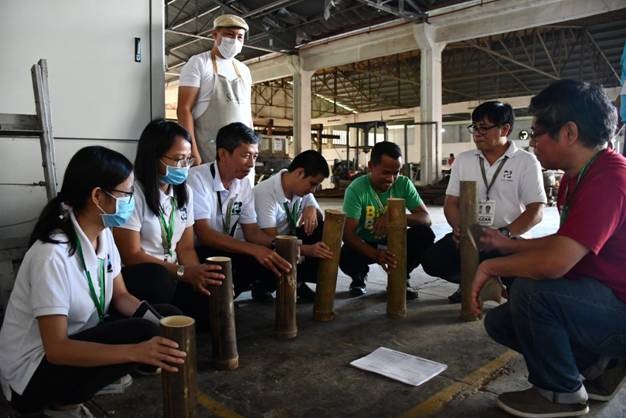Musical instrument maker commends DOST-FPRDI

Nine years into making musical instruments, Jay Sarita is still looking for ways to improve his craft.
The owner of the Dipolog-based Sarita Instrument Artisan and a Master Teacher at the Dipolog Pilot Demonstration School, Sarita has commercially produced traditional rondalla instruments, including banduria, octavina, laud and base guitars. He has also made bamboo musical instruments (BMI) such gabbang, angklung and xylophones.
“My interest in music led me to become an instrument-maker and music teacher. Instrument- making was all trial and error for me, until I met Dr. Wu Shih-Yin, a retired professor and consultant of the Taiwan Bamboo Orchestra. He taught me how to speed up my production process using science-based procedures,” Sarita shared.
“I encountered setbacks when I was starting out in the business,” Sarita said. “For example, my technique in producing wooden xylophones was not completely applicable for making the bamboo version. Because of the bamboo culm’s natural round shape and varying thickness, it was difficult to cut it in precise dimensions,” he said.
To lend a hand to commercial instrument makers, the DOST- Forest Products Research and Development Institute (DOST-FPRDI) started in 2019 the “Bamboo Musical Instruments R&D Program”. The program seeks to come up with technologies that will enhance the musical instruments’ sound quality and standardize the production of specific BMIs.
“We have been talking to BMI makers around the country and most of them said they need technologies to upgrade their products and ease the production process,” explained Program Leader Aralyn L. Quintos.
According to her, commercial producers like Sarita also complain about the durability of their BMIs. Some instruments tend to crack when brought to a place with a different climate (i.e., from highland to lowland provinces, from tropical to temperate countries), while other products are prone to bukbok (powder-post beetle). “We hope to help boost the industry by introducing new processes that will solve these problems,” Quintos added.
Sarita, meanwhile, looks forward to a growing BMI sector and to passing on his knowledge in using and making traditional musical instruments to the younger generation. That will only happen, he said, with the help of science-backed solutions from groups like DOST-FPRDI.
“I am grateful to DOST-FPRDI for leading the way in this field,” he said. “We have no choice but to constantly innovate if we want to perfect our craft. We owe it not only to ourselves but to the next generation, if we want them to also enjoy the richness of our country’s musical heritage,” he ended.
The BMI research program is funded by the DOST Grants-in-Aid, and is conducted in collaboration with the UP Center for Ethnomusicology, UP Electronics and Electrical Engineering Institute, and the Philippine Normal University. ### (Apple Jean C. Martin- de Leon, 29 June 2020)
1.jpg)